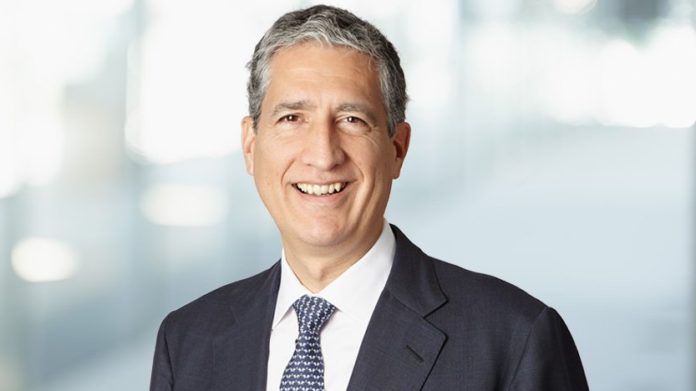
AT 61 years Alberto Calderon, AngloGold Ashanti’s new CEO, is but a year younger than Nick Holland who stepped down from Gold Fields in terms of its mandatory retirement age. Calderon is putting off retirement for as long as possible.
“I spoke to friends and I knew that I did not want to be a non-executive professional. That would be too boring. I wanted to be busy and see what lands,” he said in an interview with Finweek shortly after the announcement of his appointment, effective September 1. “This appeared,” he said of AngloGold. “A friend told me, why don’t you look at it?”
And that’s how some top executive placements start, apparently: in a world where information flow is dizzyingly sophisticated, there’s still nothing like the word of mouth.
Calderon had recently resigned as CEO of Orica, a large Australian explosives company. Before that, he ran a career as one of BHP’s ‘man for all seasons’, running its aluminium and nickel divisions, as well as leading corporate development and its one-third stake in Cerrejon, the coal mining complex in Colombia from which Calderon hails.
According to him, AngloGold is a fixer-upper; one of those old-money, frayed-at-the-edges property gems you find on a Sunday drive through the suburbs.
Well, he didn’t say it like that exactly. His actual words were: “I read analyst reports, years of them, and I saw this company was trading at a massive discount to fair value compared to other companies. I thought I could help.”
In the estimation of one Australian portfolio manager, Alberto Calderon is old school with a steady by-the-book way of doing things. He could also be very corporate; in fact, very ‘Anglo American’ of, yesteryear.
That may be what AngloGold needs right now.
Said Calderon: “I am convinced that every large company needs a CEO for its times.” In his view, AngloGold needs “… more international experience, more commercial [focus], and a track record with mining company delivery”.
Strategic vacuum
AngloGold has been left twisting in the wind since its former CEO, Kelvin Dushnisky surprisingly resigned in August 2020.
The interim CEO, Christine Ramon, has been managing the company, and her return as CFO is viewed positively by analysts. It will provide continuity and “… a quick ramp up with the management team”, according to RBC Capital Markets analyst, Tyler Broda.
But until a permanent CEO was appointed, questions about AngloGold’s long-term direction have been omnipresent in everything it said and did. These were not questions about the suitability of the strategy – which has won plaudits – but whether a new boss would disturb what needs only to be implemented.
Analysts were positive about Calderon’s appointment.
“Calderon is a seasoned resources industry executive, his familiarity operating across multiple jurisdictions provides a degree of requisite experience for multi-jurisdictional AngloGold,” said RMB Morgan Stanley analysts. The bank points to AngloGold’s Colombia projects as a major point of departure for Calderon.
It’s true, developing the projects – Quebradona, La Colosa, and Gravelote – representing 38.5 million ounces of gold in mineral reserves, as well as copper by-products, – is critical, especially for a company that in 2020 sold the last of its South African mines, the giant Mponeng, west of Johannesburg.
René Hochreiter, an analyst for Noah Capital, said that Quebradona if completed according to plan “… will represent a massive 32% in value of AngloGold”. He added that the appointment of a Colombian national as CEO for a single orebody “… could constitute a third of the value of the whole company is therefore considered astute in our opinion”.
Yet AngloGold also needs to deliver on stated aims: to chip away at debt; pay dividends, and repatriate the $500m in profits from Kibali, the Democratic Republic of Congo mine. There’s also the recent complication of Ghana mine Obuasi’s suspension.
This was following an underground accident in May that worried AngloGold enough for it to review the re-engineering of the mine which, at a cost of $500m, is intended to lock in gold production of 350,000 to 400,000 ounces a year.
It is critical Obuasi is put back on its rails, a job to which Calderon adds the life extension of another African mine in AngloGold’s portfolio: Geita, which starts to run short of reserves in four years.
Both jobs are especially technical in nature. Given that Calderon is not a mining engineer – one of the criticisms levelled against Ramon’s suitability – will this be a problem, especially as throughout his varied career, he’s never managed gold assets?
“With the board (during the interview selection process) … We went about being an operator. It’s not like I was a CFO. I was in the direct line of coal, diamonds, nickel, and aluminium. Every commodity has its own particularities, but they also have their similarities,” he said.
“I also know I have a lot to learn and I will immerse myself in commercial and technical issues. But the role of a CEO is also to support staff. My experience is that things that go to the CEO are never black and white; they are grey, they are soft. But I do deeply understand operations.”
UK listing
People have their own rituals over life-changing decisions: some rely on gut feel, others are scientific. “Health, love, work: those are the most important things in that order,” said Calderon. “It will involve sacrifices and all that and so the most important thing was the support of my wife.”
Work, though, starts officially in about two months. Calderon says the first four weeks will be in AngloGold’s Johannesburg headquarters, but in the main, he will ‘co-locate’, but based in Perth near to the group’s second-largest mine, Sunrise Dam. “In time, the board will decide where to be located. But for the time being, I will move around the world.”
This raises the question of where AngloGold will eventually locate.
Prior to the departure of Dushnisky, the company was said to be considering a primary offshore listing, most likely in London. The logic was that UK investors were seeking a gold company they could hang their hat on following the delisting of Randgold Resources which had merged with Barrick during 2019.
Since then, there’s been a flood of gold firms listing in London including Endeavour Mining, a West African play that operates very much in the Randgold mold of greenfields exploration and entrepreneurialism. In June, however, Nordgold, a Russian gold miner, abandoned its UK listing citing a deterioration in the outlook for gold, suggesting the UK investment market was now saturated with gold options whilst the market had cooled.
Said Calderon: “The move to London or the north is not a priority in the short-term.
“It’s just part of a whole range of options. For me, there are many options over the next two to four years and my ambition is to claw back and recover that discount the company suffers from.”
- Sign-up for our free daily news alert here










